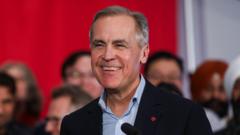As the Trump administration confirms a 25 percent tariff on imports from Canada and Mexico, cities like Windsor, Ontario brace for possible economic fallout. Despite claims of a drug crisis and migration issues at the border, evidence suggests that the suggested problems are more pronounced in the other direction.
Trump Administration Instigates Trade Tensions with Canada and Mexico

Trump Administration Instigates Trade Tensions with Canada and Mexico
The Trump administration's new tariffs on imports from Canada and Mexico herald the potential onset of a trade war, igniting economic concerns across the border regions.
After about a week of contrasting messages, the Trump administration has confirmed that the anticipated 25 percent tariffs on imports from Canada and Mexico will be enacted starting this Saturday, marking a significant escalation in what many are predicting could become a trade war between these neighboring countries.
Windsor, Ontario, situated just across the Detroit river, exemplifies the deep economic ties between Canada and the U.S. and now finds itself facing considerable uncertainty. According to Windsor's mayor, Drew Dilkens, local communities are bracing for implications that could arise from these new tariffs.
During a press briefing, White House Press Secretary Karoline Leavitt stood by President Trump's assertions that both Canada and Mexico were to blame for the unrestricted passage of migrants and fentanyl crossing into the U.S. However, investigations conducted by my colleague Vjosa Isai in Toronto suggest that the impact of fentanyl entering the United States from Canada is quite limited compared to the substantial illegal drug trade that flows from the U.S. into Canada.
Moreover, Canadian authorities have contended that the number of migrants entering the U.S. from Canada is significantly lower than those arriving from Mexico and have noted their commitment to bolstering border security. Despite these claims, the tariffs are set to be implemented, leaving many questions unanswered regarding potential exemptions for Canadian oil and the actual goals of the Trump administration.
As highlighted by my colleagues Ana Swanson and Alan Rappeport, President Trump has historically employed tariffs as a mechanism to address trade grievances; however, it appears he is now leveraging them for objectives that may extend beyond mere trade considerations.






















